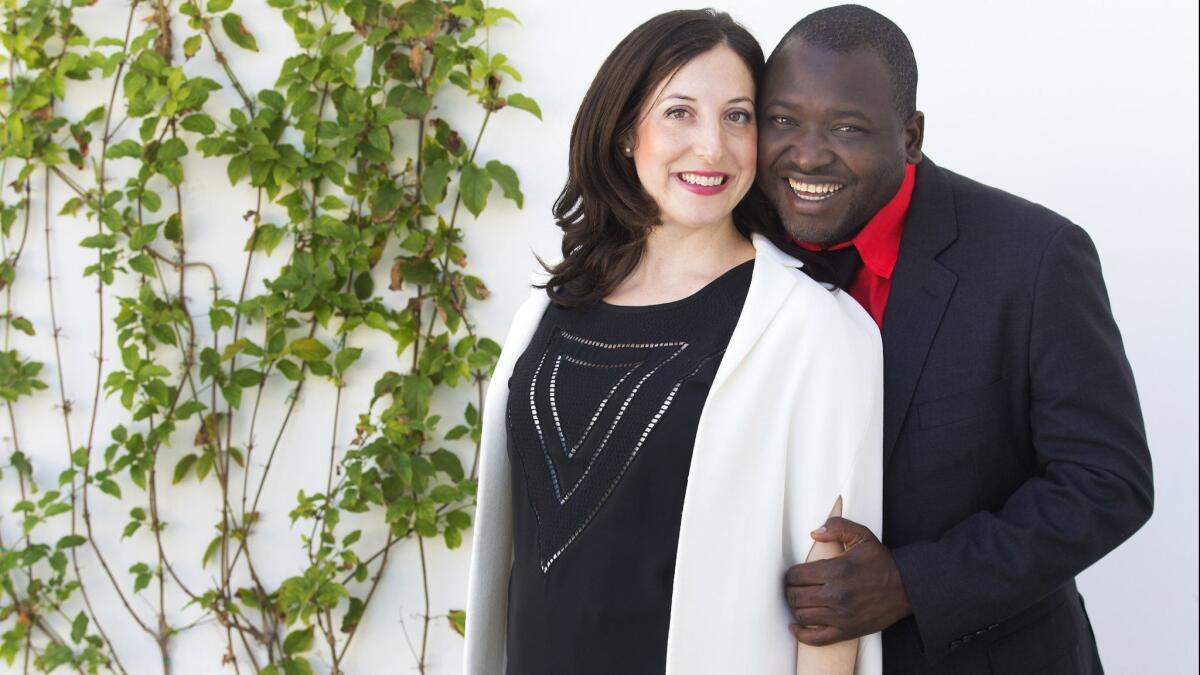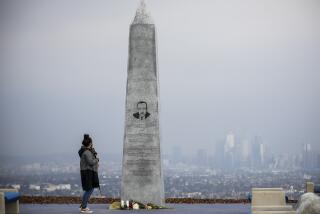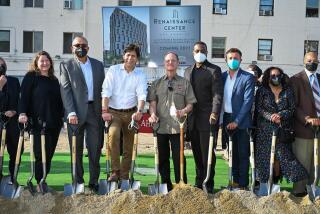Global Development: Inspired by Mandela and King, Kenyan group helps deliver water and fight poverty in slums

When Kennedy Odede was a teenager in Kenya living in the streets of Kibera, one of the world’s biggest slums with tens of thousands of people struggling to survive, he got tired of feeling hopeless and angry over the inequality between the privileged and the poor.
Inspired by the examples set by the Rev. Martin Luther King Jr. and Nelson Mandela, he turned his gloom and frustration into action.
For the record:
8:45 a.m. Dec. 8, 2018An earlier version of this story incorrectly stated the number of people served by SHOFCO in 2017, as well as the number of patients treated in its clinics in 2017.
He purchased a soccer ball for 20 cents and started a program in 2004 to teach the sport and encourage people to talk about pressing issues they faced in the community. The program soon branched out, and through the influence of women like his mother, included education programs for girls and community forums to raise awareness of gender-based violence.
Those programs marked the foundation of what became Odede’s nonprofit organization called Shining Hope for Communities, or SHOFCO.
A few years later, Odede met his wife-to-be, Jessica Posner, and the pair worked to devise a model for the organization based on three goals: to operate a network of schools for girls, set up an aerial network of pipes that would give people access to clean water, and offer health services to slum residents.
“When I was a teenager, I read a book by Dr. Martin Luther King Jr. and learned how he led the civil rights movement in Alabama. People came together and saw hope,” Odede, 34, said in a recent interview. “In Kibera, as a community, we knew we needed clean water. Diseases like cholera and typhoid were common. Women were also being abused, and so we knew we needed to fight for women’s rights and for equality.”
The organization operates in several slums across Kenya and helped provide free education and health services to approximately 220,000 people in 2017, according to the organization’s annual report.
It also runs seven health clinics, six in Kibera and one in Mathare. In 2017, the clinics served more than 165,000 patients.
Most of the organization’s $7-million annual budget comes from donations and grants awarded by the U.S. and Kenya. Odede expects the annual budget to surpass $10 million by 2021.
The organization in October received a humanitarian prize worth $2 million from the Conrad N. Hilton Foundation based in Agoura Hills. The foundation highlighted the organization’s operation of tuition-free schools for girls in Kenya, its delivery of clean water and its mobilization of communities in the country’s urban slums to lift them out of poverty.
Its model has helped show the importance of the roles local organizations play in eradicating gender-based violence and addressing public health issues, the foundation said.
Here is a look at some of the challenges in Kenya’s slums and what Shining Hope for Communities is doing to help alleviate poverty:
Where Shining Hope for Communities works:
In Nairobi, the capital, the organization started with programs in Kibera, where population estimates vary from about 250,000 to more than 1 million people. Most people living in Kibera earn less than $1 per day. Diseases including HIV are prevalent, and access to clean water is rare.
The other slums include Mathare, which has an estimated population of about 500,000 people and is one of Nairobi’s oldest slums; Mukuru, home to 100,000 people; and Bangladesh, located in the port city of Mombasa and home to an estimated 2,000 people.
What made this organization impressive?
The Hilton Foundation jury chose the organization for its humanitarian award because many of the programs are led by people who grew up in the slums and still live there.
Out of 469 people the organization employs, 78% are people who live in slums.
Peter Laugharn, president and CEO of the Hilton Foundation, said it was one of 216 nonprofit organizations nominated for the annual award.
“The work that SHOFCO has done from within the community is something that is benefiting the community, and there is so much to be learned about their approach to their work,” Laugharn said.
What’s been done to address girls’ education?
The organization runs two schools that teach a total of 519 girls. One is in Kibera and the other is in Mathare. The school in Kibera enrolls students from prekindergarten up to eighth grade, while the school in Mathare enrolls prekindergarten up to third grade.
Idah Mwongeli, a 15-year-old from Kibera, graduated eighth grade from the group’s middle school for girls in 2017. Idah now attends high school in Greenfield, Mass., on a grant awarded by the Newman’s Own Foundation— a philanthropic organization created by the late actor Paul Newman. Even with improved schools in Kibera, Idah decided to attend school in the U.S. to advance her studies and fulfill her passion for travel.
“I hope to become a pilot. My favorite subject is math,” she said in a phone interview.
What’s been done regarding water needs?
More than half a million people living in Kibera have limited access to water, and much of it is contaminated. Infant mortality rates and diarrhea rates in Kibera are more than three times the rate in Nairobi, according to the United Nations.
Poor infrastructure and local mismanagement are reasons for constant water shortages, according to the World Bank.
The bulk of residents in Kibera rely on water kiosks run by private vendors. Most of the network of pipes that deliver water from overhead towers to kiosks throughout the slum are made of plastic and can easily crack or be manipulated by private vendors seeking to cut off the flow to raise the price, according to a World Bank report.
Some private vendors charge slum residents exorbitant prices. Meanwhile, Odede’s organization charges $1.18 per 264 gallons, compared with $2.65 charged by some private vendors. The World Bank estimates that of the 650 water kiosks in Kibera, 98% are run by private entrepreneurs. About 20 are run by nonprofit groups.
In 2016, Shining Hope for Communities launched a project to try to solve the water problem. After speaking with community leaders and residents, the organization created an aerial piping system made out of PVC pipes that is 20 feet above ground and therefore helps prevent cartels from cutting off the flow of water to households. The setup includes overhead water tanks in Kibera that distribute thousands of gallons of water to 24 water kiosks.
Community members determine where to place the pipes, and local residents or employees of Odede’s organization run the kiosks. In 2017, the aerial piping system provided 11,095 people with water at a 60% lower cost than private vendors run by cartels. The organization hopes to eventually provide water to many more people.
The organization expects to use the aerial piping system in Mathare and Mukura as well.
Odede said he was excited to see the organization accomplish some goals. In recent years, he has managed it from New York and Nairobi so that he could attend meetings about grants and give speeches before international donors. He’s often been away from the projects that have come to define his organization, and hopes to return to his roots.
“I miss being on the ground in the community,” he said.
Follow me on Twitter @melissaetehad
More to Read
Start your day right
Sign up for Essential California for news, features and recommendations from the L.A. Times and beyond in your inbox six days a week.
You may occasionally receive promotional content from the Los Angeles Times.







